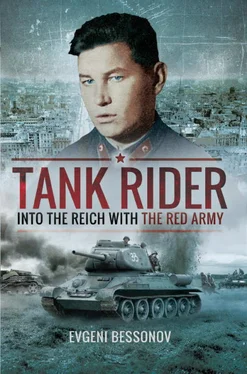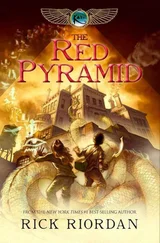In general, our battalion’s and the Brigade’s actions deep in German rear in winter 1945 were a military success. I do not know about the other companies, but our company did not have high casualties. The Brigade was moving forward at high speed and as a result we were at a significant distance from the Field Army’s infantry units. We had certain difficulties because of this – in particular, it was harder to supply tanks with fuel and ammo.
We arrived at the Oder on 23 or 24 January, 1945, with only our company and the battalion commander with his deputies. Other companies of the battalion were at that time engaged in battles with German reserves that had arrived. By that time other units of our Corps – the 17th Guards Mechanized Brigade with some units of the 16th Guards Mechanized Brigade had already crossed the river after heavy fighting. As for us, we crossed the river relatively safely, on a small ferry, although under German bombs – finally, the German air force appeared again. The Germans were still putting up resistance on the other side, and the company, assaulting the German strongpoint jointly with units of the 17th Guards Mechanized Brigade, managed to throw the Germans back. By the way, the commander of our 4th Tank Army, General Lelyushenko, was already there at the crossing, and that was just two days after the 15th Guards Brigade had crossed the Oder!

We captured the German town of Keben together with a company from another Brigade. Having reached its western outskirts, we stopped. For some reason battalion commander Kozienko was also there. He was receiving orders for attack first from the commander of the 17th Guards Mechanized Brigade and several days later from the Chief of Staff of the 6th Guards Mechanized Corps, Colonel Koretski. Our company was defending the crossing and other dangerous approaches. We put ourselves in order in Keben, even getting our hair cut by the medic (they never shaved soldiers’ heads at the front), somehow washed ourselves, mostly the upper parts of our bodies. It was a pity that from time to time we were disturbed by the German air force, but apart from that, it was almost paradise, even our kitchen drove up. Both our bodies and souls rested and we could even sleep in warm houses.
The main body of the Brigade caught up with us several days later; the 2nd and the 3rd companies of the battalion also joined us. They arrived quite depleted, but they were immediately thrown into battle to assist the 17th Guards Brigade that was trying to extend the bridgehead before strong German reinforcements arrived.
The battalion commander ordered me to report to the Corps Chief of Staff Colonel Koretski. When I arrived and reported, he looked at me and said: ‘You know what, Bessonov, you have been in the Brigade for a long time. Kozienko sent you here on my order. Your task is to guard the crossing, the Corps staff as well as put out fires in the city. You take the mansion across the street from my Staff, and always be there at hand. Do not let any other units into the mansion.’ This is how I got the mansion for my platoon and the 2nd platoon of the company, a total of not more than 30 men.Vyunov’s and Guschenkov’s platoons, in turn, followed the battalion together with the company commander.
The mansion was rich; it had everything one could imagine! There was enough food and the soldiers cooked it themselves. Soldiers would be cooking all day long, grilling something and drinking tea. We did not drink alcohol, except for some weak wine – anything could be found in the mansion’s cellar. We slept on beds. I had a wide bed with rich linen and a satin blanket. I could take off my clothes before going to bed! We threw away our underwear and replaced it with German silk underwear. Everything would have been just perfect, if only Koretski did not send us to put out fires and on guard duty during air raids against the crossing. Soldiers of our arriving infantry units set the houses on fire as revenge for their houses burnt down by the Germans in the Soviet Union. We did not have any equipment to extinguish the fire, so we would just come and stand at a burning house, watching until it burnt to ashes. That’s why the most effective measure was to send patrols and catch the arsonists. It helped, but not in all cases. Sometimes we were just pretending to be extinguishing the fire, so that Koretski did not rebuke us. I should say that that period was a rest for the platoon. Before that we had travelled at least 600 kilometres in 12 or 13 days from 12 to 25 January, 1945.

ON GERMAN SOIL

We were now on German territory and everything there was different from what we saw in Poland. Highways were covered with asphalt; roads to fields and barns were covered with cobblestone. We saw clean pine woods without any brushwood, rich houses and mansions, small roadside villages and farms with peaked red-tile roofs. However, there was not a single living soul in the city. The population had been evacuated westwards, far across the Oder, leaving all their belongings in the houses, including cattle and poultry. Some guys found two really old women in Keben when searching for German soldiers, but they did not find anyone else.
Our rest at the ‘resort’ did not last long. One day Colonel Koretski called me and ordered the battalion to depart, giving me a truck and explaining the route to me. We left the ‘resort’ with sadness. I found the battalion in a village, where it had stopped for a mid-day rest, and reported my arrival to both battalion commander Kozienko and company commander Chernyshov. I accommodated my soldiers and went to the house where some officers gathered for lunch. They greeted me with joy, almost shouting ‘Hurrah’ – the officers were a bit tipsy and were fooling around. They made me sit down at the table, and poured a shtrafnaya or punishment glass for me (a punishment glass is an extra glass of wine or vodka that a person has to drink if he or she is late for a party – translator’s comment) . I noticed that besides Vyunov, Kes, Guschenkov, Belyakov, Tsikanovski and Mochalov there was a strange Lieutenant in the house. I was introduced to him – this was Fedor Popov, with whom we fought till the end of the war. A brave, middle-sized, physically fit and modest person, he became a good comrade to me. Besides him, Lieutenant Grigori Mikheev arrived in the company in those days to replace wounded Petr Shakulo as a platoon leader. A native of Siberia, he was a big and physically strong guy; later we became good friends. He came to us from the signal platoon. He was dismissed from that office for drunk driving, when he lost control over the truck of the signals platoon and the truck capsized. However, they put it back on wheels later, no one was hurt, but Mikheev was punished and appointed platoon leader in a motor rifle company.
On the evening of 4 February we started our tank raid. The battles that followed were bitter; the Germans resisted stubbornly, holding on to every village and hill. The enemy threw Vlasov’s soldiers against us – we would defeat them as well, but I should say they fought better than the Germans. The Germans deployed Panzerfaust anti-tank missiles en masse against our tanks. It was a dreadful close-range weapon against our tanks and other vehicles. A Panzerfaust easily penetrated a T-34 tank, its explosive energy was enormous, and it could even penetrate a JS-2, if it hit the side.
As usual, I travelled on tanks with my platoon far ahead of the battalion. Once, before we could reach a small village at the road, we came under heavy fire. The soldiers quickly dismounted, while the tanks drove back a bit. I moved forward a little with my platoon, but had to lie down in a ditch because of heavy fire. Snipers were firing. Besides that, I saw anti-personnel ‘ spring -mines’ and anti-tank mines. If you touched the wire from a ‘ spring -mine’, it would jump up to 2 metres and explode, killing men with its contents. Anti-tank mines were placed on the highway.
Читать дальше














